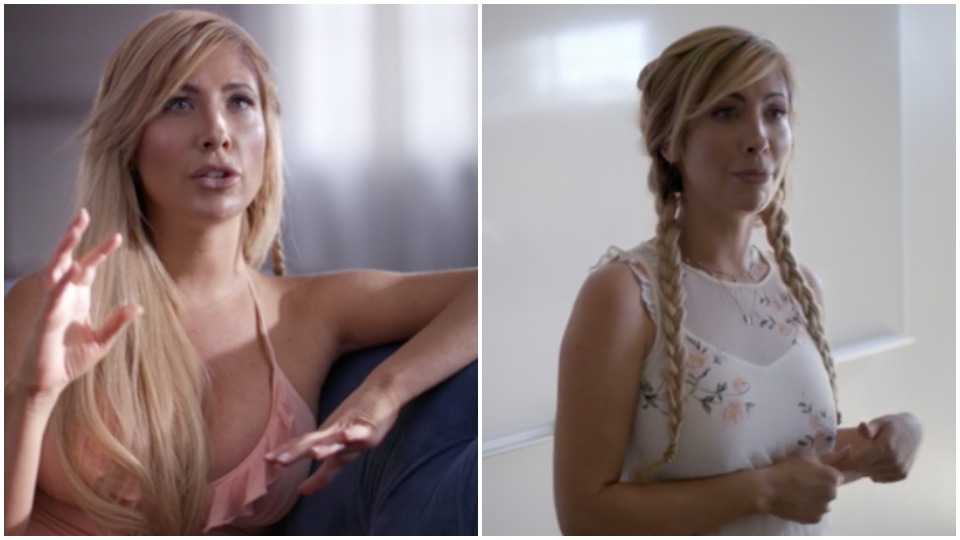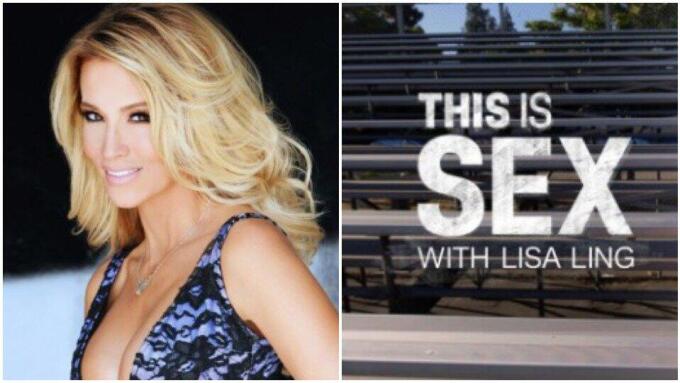LOS ANGELES — The new season of docu-series “This is Life With Lisa Ling” debuted Sunday on CNN focusing specifically on “porn literacy” and addiction to porn. Sensationalized teasers ahead of the premiere raised a few red flags with Jessica Drake, the noted sexpert and Wicked Pictures contract star, and after watching the episode twice, she shared her concerns with XBIZ.
“I have so many thoughts about tonight’s ‘This is Life’ with Lisa Ling,” she tweeted on Sunday. “I’m going to let them marinate overnight. So much to unpack.”
Justin J. Lehmiller, Ph.D., is an educator and Research Fellow at The Kinsey Institute. He previewed the episode and subsequently raised concerns with Ling. “While there’s much that we agree on, including the idea that porn is not an effective substitute for sex education, there are some aspects of the episode that I worry could potentially leave viewers with the wrong impression of how porn impacts people, especially the idea that it is ‘addictive,’” he said.
"The show focuses on people’s personal opinions about and experiences with porn and doesn't explore the science — in fact, no researchers or doctors are interviewed on screen during the episode," he observed. "So while it's certainly a thought-provoking show, there were some missed opportunities for a data-driven discussion."
Ling stressed they meant the episode to be experiential. "(W)e have found that by immersing ourselves amongst people who are going through these things, I think we get a better sense of and we're more relatable to viewers who may be experiencing similar things," she told Lehmiller. "And if they do feel somehow like they connect with the information that we're giving them or the people that we're profiling, then they can seek out that more professional or clinical information."
Drake told XBIZ this morning that she re-watched the episode. "I wanted to come from a place of responding, not reacting," she said.
“I’m a massive fan of Lisa Ling. I love the show. I think ‘This is Life’ has always been done really well. They’ve definitely presented some controversial topics in an unbiased, impartial light,” Drake continued. "But when I started seeing all the promos for the porn episode, I thought ‘Wow, this is really sensationalized in a way I didn’t think it was going to be.’”
Drake echoed Lehmiller’s concerns about the segment that focused on men in treatment for porn and sex addiction. “What they were doing was enforcing some fear-based tactics and judgmental feelings about porn. I don’t want to minimize anyone’s experience or be dismissive of anyone’s personal experience, but when I was listening to their stories, it definitely seemed like there was some other commonality or some other influence,” she observed.
“Blaming problematic behavior on porn does everybody a disservice. Whether it’s an addictive personality or diagnosed compulsive behavior, porn is just the scapegoat so often. And with the men [in the film], it really seemed like they have a lot of shame to unpack, not just around porn, but things like masturbating. The constant blaming of porn for any addictive or compulsive behavior — I’m just tired of it. It happens a lot.”
It disappointed her that no scientific or medical experts were included in this segment.
“I’d have liked to have seen more research. Where’s the science? Where’s the facts? Give me the knowledge that really backs this up. Don’t just give me a roomful of men that are commiserating because they [never] unpacked their shame around sex.”
 A segment of the film that turned a spotlight on the performer, activist and educator Tasha Reign earned kudos from Drake. “Tasha’s piece was amazing,” she said. “It’s one of the best interviews that anyone’s done from the adult industry that the mainstream media has not taken and torn to shreds. Lisa was very open-minded and Tasha got her message across. She did a great job.”
A segment of the film that turned a spotlight on the performer, activist and educator Tasha Reign earned kudos from Drake. “Tasha’s piece was amazing,” she said. “It’s one of the best interviews that anyone’s done from the adult industry that the mainstream media has not taken and torn to shreds. Lisa was very open-minded and Tasha got her message across. She did a great job.”
Drake acknowledged an hourlong documentary can only cover so much ground; however, she feels Ling could have shown viewers the compelling, on-the-ground work being done by the porn industry to educate and inform.
“We needed a lot more voices in this narrative,” she said. “Tasha is brilliant, and she’s been doing the work around consent education for awhile now. It’s very important to her. I do this work. Last night, I spoke at Chapman University for over two hours, to 200 students. I’ve been doing this work for seven or eight years now, but I’m no longer an anomaly in this equation. We have other people in the sex education [field] who regularly teach these things.”
She believes Ling missed a critical opportunity to discuss the actual point and purpose of porn.
“The reality is that there is a lot of work being done in this area right now. And I get that the show only had an hour. And I get that they were probably pandering to people who have a certain set of beliefs about porn. But they could have done a better job. When they wrapped it up, when they went back to the men they started with in the beginning, and they asked, ‘What do you want moving forward?’ One of them said, ‘I don’t want synthetic love.’ That was a signal that this person had been looking for something more as they were discovering porn. We’re not selling love; we’re not modeling what a loving relationship could or should look like. We’re literally modeling some very specific sex acts; we’re catering to sexual fetishes, we’re not trying to fill an emotional void.”
Drake is pleased Ling made the point that it is the job of a porn star to entertain, not educate. However, she wishes producers had expanded, however briefly, on that idea.
“One of the other men said their goal was to remove porn and masturbation from their lives. Oh! When I hear things like that, it hurts me, not just as a porn performer but from a very personal level. In my life, I knew from an early age I was interested in things I thought no one else was interested in," she recalled. "When I was going through puberty, I was being drawn to people of the same sex, I was into things that I thought made me a freak because I didn’t know any of this stuff existed. So the first time I saw porn, it normalized some of the ideas I held in my mind. It was a positive experience, and it was an opportunity to see I’m not alone. There are women who like sex with other women, there are people that are into kink and BDSM, there’s a wide range of sexuality, it’s not just a closed little box that I’d been raised to believe.”
She praised another segment of the film centered on a peer-led porn literacy group.
“I see more of that when I’m in universities now. It will [often] start with the LGBTQ group at the college where I’m speaking and they’ll have some kind of peer-led sexuality group and within that, they’ll cover porn. That’s going to be key moving forward. I talked about it last night with the students at Chapman. They didn’t have [a group] specifically for porn, but they did for sexuality,” she observed.
Drake is disappointed Ling missed a key point in this discussion.
“The problem isn’t pornography, it’s free porn — free porn and accessibility. When you hear about porn as a public health crisis, I would love for people to ask, ‘How did the porn get to these minors?’ And take a closer look at piracy and tube sites. We’re not putting our content in the hands of minors. We’re not doing that. We’ve done nothing but try to keep our product out of the hands of minors."
“Who, really, are the gatekeepers of porn?” she asked. “Who are the gatekeepers for navigating porn? Where does the onus fall? Parents, teachers, schools? The people who make porn or the paysites that put out the porn? Is it the tube sites that have made porn so readily accessible?”
Drake admires Ling for her ability to appear nonjudgmental, and respects her neutral tone. “Her baseline message that, as a society, we need to communicate more about sex? That is 100 percent true. And it echoed some of the things that Tasha was saying in her interview."
“This would have been a great show four or five years ago,” she continued. “When you begin a show talking about such an important topic and your lead-in panders to some very outdated information that’s been disproven by research, you’re setting it up for a particular result. There are a lot of people in the educational community that don’t have the [brand] name of a porn performer. I would have liked to have seen more educational voices showcased within this project, even if it was just a brief nod to the work being done by other people in this area. There are a lot of voices in this conversation. This show was a bit behind the times.”
Find “This is Life with Lisa Ling” on CNN.com; read Lehmiller’s interview with Ling at PsychologyToday.com.
Follow Drake on Twitter.
Images: Screengrabs by XBIZ via CNN.com








